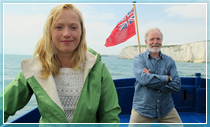07 December 2012
Essex student in BBC documentary
Colchester Campus

Essex PhD marine biology student Sarah-Jane Walsh will be appearing in BBC One documentary Miniature Britain next week.
Sarah-Jane was invited to take part in the programme due to her expertise in the biology of marine organisms – the micro organisms which provide a crucial source of food to many large aquatic organisms, such as fish and whales.
In the programme, to be broadcast on Wednesday 12 December at 8pm, Sarah-Jane joins presenter and biologist George McGavin in Dorset to look at miniature organisms inhabiting our coastlines and their importance in driving marine food cycles and cliff formation in Britain.
Miniature Britain follows George on a journey around the British Isles to show that it really is the tiny things on our planet that matter the most. Using a revolutionary new microscopic camera which is seven thousand times more powerful than the human eye, the programme will open up the miniature world that is normally hidden from view as it is just too small to see with the naked eye.
For Sarah-Jane, who is from the University’s Coral Reef Research Unit, the programme gave her the chance to see things in a new light with the high resolution microscope. “It is amazing that these creatures are so intricate in detail, yet unable to be seen by the human eye. These organisms are like the artists of the sea, creating these incredibly detailed designs that are brought to life with the power of microscopy,” she explained.
Sarah-Jane hopes the programme will open up people’s eyes to just how vital a role micro organisms like plankton play in our world.
“We are very dependent on these animals which have been around for millions of years. These small algae are vital to the functioning of our planet,” explained Sarah-Jane. “They are responsible for 50 per cent of the air we breathe and provide food for ocean giants such as whales and basking sharks which roam our coastlines. They are also responsible for the formation of our own landscapes, building up over millions of years to form iconic structures such as the cliffs of Dover and the Jurassic coastline.”
Ends
Note to editors
For more information please contact the University of Essex Communications Office on 01206 872400 or e-mail comms@essex.ac.uk.
Photographs available via link: www.flickr.com/photos/universityofessex/sets/72157632184269442/.
...more news releases